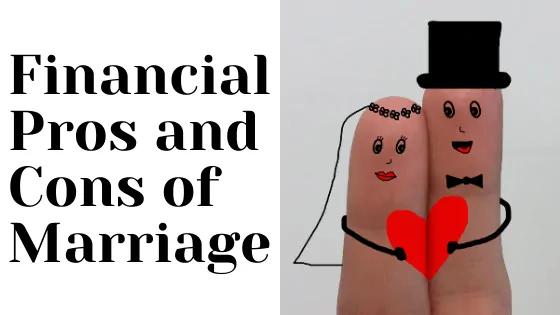Financial Pros and Cons of Marriage

Is marriage good for your financial health?
Are you better off staying single?
If you’re in a relationship, you might be wondering if living together makes better financial sense than getting married (or the other way around).
Weighing the financial pros and cons of marriage is far from romantic, but it’s an important and practical step to preparing yourself financially and emotionally should you decide to get married.
When you tie the knot, you’re making a promise to stick with your partner no matter what—for better or worse, for richer or poorer.
Marriage can have a huge impact on your finances, whether good or bad. And so, it’s important to know how marriage will affect you financially before you say “I do” to your significant other.
The Financial Pros of Marriage
What are the financial benefits of being married? Aside from receiving wedding gifts, marriage comes with certain financial perks.
Here are the biggest reasons why marriage makes financial sense for couples.
Sharing Household Expenses
A couple living under one roof can share many household expenses, including rent, food, groceries, and utilities—and save money in the process.
Splitting these costs (which don’t necessarily increase) between the couple is a lot cheaper than the living expenses of two single persons in separate households.
This financial advantage, however, isn’t exclusive to married couples. Couples living together without marriage and even single people can cut down on their living expenses by sharing them with a partner, family member, friend, or roommate.
Financial Protection
Unlike single people, couples enjoy the financial security of marriage. A spouse’s income may cushion the financial impact of his/her partner’s sudden job loss or serious illness.
Being married also gives you the option to switch careers, pursue your passion, or stay at home to focus on raising kids—as long as your partner’s income is enough to support your family.
Married partners also enjoy financial protection under the law. For example, if you jointly buy a house and eventually, your partner splits up with you or dies without a legal will, you can make a claim on your property only if you’re married.
And when a marriage ends up in divorce, estranged partners are still legally protected, as the court decides on how to divide assets equally between them.
Tax Benefits
Lower Taxes
You can file taxes jointly with your spouse and pay significantly less than single taxpayers—that is, if one of you earns a lot more than the other. The spouse who earns less can be a tax shelter for the higher-earning spouse, which keeps the couple in a lower tax bracket and thus saves money on taxes.
Tax Exemptions
Marriage exempts you from gift tax and estate tax. You can give money, property, jewelry, or any valuable item to your spouse for an unlimited number of times without having to pay gift tax. If your spouse passes away, you can inherit any assets left behind without paying the estate tax on it.
Cheaper Health Insurance Costs
This financial benefit of marriage comes very useful if one of the couple has no health insurance coverage, what with the rising cost of getting insured nowadays.
If your partner, for instance, is covered by a company-sponsored health insurance plan, he/she can enroll you as a dependent for free or an additional cost. Sharing insurance policies is more affordable for married couples than buying separately.
Qualifying for Larger Loans with Better Terms
Being married raises your chance of getting approved for better mortgage, assuming that you both earn an income and have good credit scores.
When you apply for a loan, the lender may consider your combined income. This results in a higher loan amount with better repayment terms than a loan based on a single income.
Sharing Retirement and Social Security Benefits
Married people can claim spousal benefits up to 50% of their spouse’s retirement or disability pension (without deducting from the spouse’s benefits) on top of their own social security benefits. Spousal benefits apply even if they are unemployed and have never paid social security contributions. After the death of a spouse, the surviving spouse receives social security survivor benefits.
The Financial Cons of Marriage
Marriage can be more of a financial liability than an advantage, depending on the situation partners find themselves in.
Here are the possible financial drawbacks of being married.
Big Wedding Expenses
For a one-day event, most people are willing to pay more than they can afford. In fact, American couples spent an average of $33,931 on their wedding in 2018, according to The Knot Real Weddings Study.
Spending a fortune on a big wedding can start a marriage off on the wrong foot. A survey by Ramsey Solutions found that almost two-thirds of marriages start off in debt. Or both partners’ savings can get drained. Either way, it’s a financial burden that’s sure to challenge a couple’s money management skills.
Even Bigger Childcare Costs
Raising children is expensive. Based on data from the Economic Policy Institute (EPI), the yearly cost of childcare in the United States ranges from $4,000 to $22,600. EPI also notes that childcare takes one of the biggest chunks in a family’s budget.
If a couple is struggling to support their children’s needs, this situation can cause a lot of stress and may put a dent in their relationship.
Higher Taxes
Not all married couples enjoy lower taxes. Those who experience the so-called “marriage penalty” are highly paid professionals whose income is about the same as their spouse’s. This leads to high-income couples paying more taxes than they would if they’re single. Rather than file taxes jointly, such couples may consider filing separately.
Financial Conflicts and Stress
Money issues between a couple can kill a marriage. Fighting over money is the second leading cause of divorce (next to infidelity), based on the Ramsey Solutions survey findings.
Usually, money fights between spouses happen when their financial personalities clash. For example, a frugal spouse may get frustrated over his/her partner’s bad money habits. Marital woes can also occur when a couple can’t agree on how to solve their family’s financial problem.
Financial Burdens of Divorce
Divorce is one of the biggest financial risks of getting married. First off, it’s an expensive process. Legal fees, for example, cost a lot considering that a divorcing couple pays for two divorce lawyers.
After divorce, its adverse financial impact stays on for a long time. Based on research by the Australian Institute of Family Studies, divorced people had fewer assets and less disposable income than married people.
Final Word
Being married offers both a short-term and long-term financial safety net. Generally, the financial pros of marriage outweigh the cons.
But the actual financial impact of marriage on you as a couple will still depend on many factors, including your income and situation (like whether you have children or not).
Most importantly, it all boils down to the person you’re marrying.
Choosing the wrong lifetime partner can trump all the financial benefits of marriage and can be more disastrous than all its financial setbacks combined.







